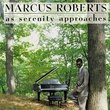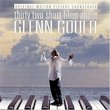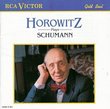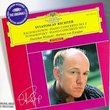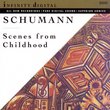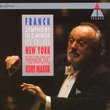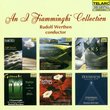| All Artists: Benjamin Britten, Simon Rattle, Berlin Philharmonic Orchestra, Ian Bostridge Title: Britten: Serenade for Tenor, Horn & Strings; Les Illuminations; Nocturne Members Wishing: 1 Total Copies: 0 Label: EMI Classics Original Release Date: 1/1/2005 Re-Release Date: 11/8/2005 Genres: Pop, Classical Styles: Vocal Pop, Opera & Classical Vocal, Historical Periods, Modern, 20th, & 21st Century, Symphonies Number of Discs: 1 SwapaCD Credits: 1 UPC: 724355804921 |
Search - Benjamin Britten, Simon Rattle, Berlin Philharmonic Orchestra :: Britten: Serenade for Tenor, Horn & Strings; Les Illuminations; Nocturne
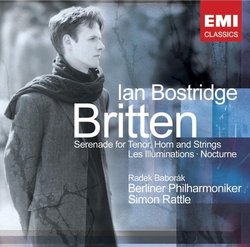 | Benjamin Britten, Simon Rattle, Berlin Philharmonic Orchestra Britten: Serenade for Tenor, Horn & Strings; Les Illuminations; Nocturne Genres: Pop, Classical
This is a wonderful record, in substance and execution. As Ian Bostridge writes in his passionately involved program notes, these three song cycles represent a pinnacle of the all-too-sparse literature for tenor and orches... more » |
Larger Image |
CD DetailsSynopsis
Amazon.com This is a wonderful record, in substance and execution. As Ian Bostridge writes in his passionately involved program notes, these three song cycles represent a pinnacle of the all-too-sparse literature for tenor and orchestra. We owe them to Britten's long personal and professional partnership with the great tenor Peter Pears, for whom he wrote all his vocal music. Listeners who remember Pears' unique and unmistakable voice and style will be astounded at how thoroughly Bostridge has made these works his own. His voice is very different but no less unique, and intoxicatingly beautiful. He has at his command colors and nuances which he uses so masterfully that they become an integral part of the music, never sounding artificial. Giving equal weight to words and music, Bostridge captures the lush sensuousness of the French cycle, set to poems of Rimbaud, the lyricism, lightness, serenity, horror and triumph of the Serenade, and the declamatory drama of the Nocturne (the last two use poetry from Shakespeare to Wilfred Owen). The cycles trace the development of Britten's style, from the tonal orientation and direct expressiveness of the first, through the greater emotional depth and variety of the second, to the descriptive, sardonic, wild, passionate rhetoric of the third. The orchestra's principals are superb in their extensive solos. Unfortunately, they are nameless except for Radek Baborák, a worthy successor to Dennis Brain, the virtuoso hornist for whom the Serenade was written. --Edith Eisler Similarly Requested CDs
|
CD ReviewsEXCELLENT SINGING: OUSTANDING PLAYING Klingsor Tristan | Suffolk | 11/22/2005 (5 out of 5 stars) "This is a marvellous disc of the most famous Britten orchestral Song Cycles - not so much for Bostridge's singing as for the stunning playing of the strings of the Berlin Philharmonic and the excellent conducting of Simon Rattle. The very opening bars of Les Illuminations give a thrilling taste of excitements to come as the violins and violas throw the fanfares from side to side of the stereo spectrum. In the hands of the Berlin Phil, Les Illuminations reveals itself to be as big a compendium of string orchestra techniques as the Frank Bridge Variations. Here are wonderfully light harmonics, creepy harmonic glissandos, perfectly together full-bodied pizzicati, haunting cantilenas, rich thrumming accompaniments. Ensemble throughout is impressively immaculate. Antique is hauntingly beautiful, Being Beauteous achingly so. Bostridge's singing is also impressive in these Rimbaud settings, bringing to some of the songs a real baritonal quality to set beside his more familiar headtones - perhaps suggesting that a Pelleas from him might be an interesting proposition. For me, the sound of the original soprano voice works better in these songs (they were first done by Sophie Weiss): it rises freer and cleaner of the string accompaniments. But Bostridge is fine among the tenor versions, up there with Pears himself. The Serenade fares a little less well after such an impressive opening. Maybe the horn player, Radek Baborak, is to blame. He seems a little cautious - the phrases of the Prologue and Epilogue seem a little disjointed, the keening sounds of Blake's Sick Rose lack the last ounce of passionate commitment, the scary glissandi in the Lyke Wake Dirge are barely touched in compared to the hair-raising whoops of a Tuckwell or even a Brain and Ben Jonson's Queen and Huntress doesn't have quite the lightness of step she should. Bostridge, too, seems to be straining a bit hard and Fischer-Dieskau-like to get the last ounce of meaning from the text. The plosive 't' at the end of 'elephant' in Cotton's Pastoral practically splashes the listener. He has recorded the Serenade before (also with a German orchestra) and despite the wonderful playing here of the Berlin strings - their splendour falls magnificently on Tennyson's castle walls - it's the earlier version I would prefer. The horn player is better in his onomatopoeic Middleton song in the Nocturne. Indeed, all the soloists are excellent in this cycle and I would single out Stefan Schweigert's bassoon solo in The Kraken for particular praise. The Nocturne always seems to get rather short shrift in comparison to the Serenade or even Les Illuminations. For me it is the finest of the three cycles. It is a central piece among Britten's explorations of sleep around that time - the Dream, the guitar Nocturnal, the piano Notturno, 'Let us Sleep' in War Requiem and 'Dormi nunc' in the Cantata Misericordium are all roughly contemporaneous. It is also more of a cycle than the Serenade with its linking 'breathing' motif on the strings (which was actually rescued from a setting of Now Sleeps the Crimson Petal, written for but rejected from the Serenade). Bostridge is better here with a little less obvious pointing of words. He copes with the magical melismas of the Coleridge setting well. He holds nothing back in Wordsworth's nightmare recollections of the September Massacres with a full-bodied scream on the parlando 'Sleep no more'. Owen's Kind Ghosts sound more than ever like a precursor of the Owen settings in War Requiem and Rattle secures a wonderfully heavy tread from his string players. Perhaps only Pears had the secret of those magic Britten phrases that flow straight through the natural break in the voice (the arch of 'Thus I my best beloved's am' at the end of Canticle 1 or the rising Dona nobis pacem in War Requiem come to mind): Bostridge can't quite match him in the similar phrase for the last couplet of the Shakespeare Sonnet, but for the rest he does achieve a near perfect balance of melodic line with judicious pointing of Shakespeare's pun-fest. The playing of the Berlin Philharmonic again is a joy to hear in this song. The voicing of the chord when all the obbligato instruments and the strings play together for the first time at the beginning of the Shakespeare is breathtaking and Rattle makes the climax of the Sonnet (and indeed the whole cycle) an overwhelming moment. The recording quality throughout this disc is superb - crystal clear but with true warmth and depth. Bostridge contributes a fascinating essay to the booklet and all the texts are there, too. All in all, an outstanding issue." Comparing Britten's 'Serenade' from Bostridge and rivals Santa Fe Listener | Santa Fe, NM USA | 06/26/2006 (4 out of 5 stars) "In 1944, a year after it was composed, Britten's Serenade for Tenor, Horn, and Strings began a long streak of excellence on disc. Six decades later we have this acclaimed new one from Ian Bostridge, so it seems worthwhile to compare it to the best from the past. (I will name my personal favorites at the end.) Pears 1944: The Gramophone calls this, the premiere recording, 'unsurpassable,' and so it would seem with the unique combination of Peter Pears, the tenor voice for which the work was written, Dennis Brain, the young horn virtuoso whom Britten also had in mind, and Britten himself conducting. There are some drawbacks, though, principally the ugly wartime sonics, which are murky and boxed-in. Pears is not as dramatic as he would become later on, and although Brain is very musical and supple in tone, he doesn't extract the last ounce of intensity from his part. Pears 1964: Pears' remake is the unsurpassable one, perhaps. We get excellent stereo from Decca, and Britten's conducting is more or less perfect. Barry Tuckwell sets a new standard in the horn part, taking hair-raising risks and underlining the darker side of the score. Pears has grown immensely in his interpretation of the poetry, but one can't escape that he is 20 years older--his voice is obviously under strain in the more difficult passages and at loud volume. Even so, his depth and artistry quickly make you forget anything but the music itself--a great recording from everyone involved. Rolfe-Johnson 1991: The Gramophone loved this recording when it came out on Chandos. The outstanding performer here is the tenor, Anthony Rolfe-Johnson, who took up Pears' artistic mantle. Like Pears he has a narrow, focused tenor with a prominent head tone (R-J's sound is sweeter and less idiosyncratic than Pears'), but more importantly Rolfe-Johnson does almost as much with the poetry as his great predecessor. The conducting by Bryden Thomson is fine, and so is the horn player, Michael Thompson, though he is too cautious to take the kind of risks Tuckwell did. Langridge 1994: This recording, originally on Collins Clasics, is on Naxos now. Philip Langridge is the doppelganger to Rolfe-Johnson, both being Britten specialists who have recorded most of his major tenor roles. Langridge has the bigger voice, with an unusual but pleasant nasality. It's less focused than Rolfe-Johnson's or Pears', so the pitch can spread a little, and some wobble creeps in under pressure. On this CD Langridge gives a notably quiet, tender reading, with a lot of variation in tone and poetic sensitivity. He is aided by the excellent conducting of Britten's disciple, Steuart Bedford. The horn playing of Frank Lloyd matches the singer in tenderness, even if he isn't the daredevil that Tuckwell was--Lloyd's suppleness is closer to Brain's in approach. Bostridge 1999: The latest generation of Pears' descendants is represented by Ian Bostridgee, who has attained more fame than the previous two tenors outside Britain. Bostridge's voice started out quite slender and cooing, so he can't attack the Serenade's more strenuous parts head on. His solution is to give a lighter, quicker version that is refreshingly different. His hornist, Marie-Luise Neunecker, is a true virtuoso, more at home in this music than any player since Tuckwell. She is also caught in vivid, clear sound by EMI. Ingo Metzmacher's condcuting sometimes lacks zest and impact, though it passes muster well enough. Bostridge 2005: Bostridge got to remake the Serenade for EMI after only a few years, not the twenty that Pears waited. In the interim his voice has acquired more weight--it's still the lightest of any being considered here, however--and that extra heft helps him to deepen his interpretation, adding more darkness and mystery to the text (mystery being one of this singer's best modes). The presence of Simon Rattle and the Berlin Phil. strings certainly ups the ante, and the first horn of the orchestra, Radek Baborak, at last brings us Tuckwell's equal in daring and risk-taking. British critics have acclaimed this recording as the only modern one to stand beside Pears/Britten, but I think Rattle and Bostridge are both a little guilty of fussiness; every syllable and musical phrase is underlined to the point where we notice the performers more than the music at times. I have owned Serenades by other singers like Martyn Hill and John Mark Ainsley, both on EMI and both in the boyish tenor vein of Bostridge, if without his notable intelligence and musical insight. I would be hapy to own either of Bostridge's efforts, but the ones that send chills down my spine are by Rolfe-Johnson and Pears 1964. P.S., Feb. 2009 -- I see that The Graomphone, surveying every recording of Les Illuminations, picked Bostridge/Rattle as the best. but to my ears, the singer strains hard at the high-flying vocal part and mostly loses the battle. A more vibrant lyrical voice is needed. Or a soprano, since the solo part is for "high voice," not specifically a tenor. " Bostridge and Rattle Offer Definitive Britten Grady Harp | Los Angeles, CA United States | 11/30/2005 (5 out of 5 stars) "Ian Bostridge continues to astound with the variety of his repertoire and the glowing beauty of his richly burnished tenor voice and his enormous musicality. Here he sings three of Benjamin Britten's finest works and with him in collaboration are Simon Rattle and the Berlin Philharmonic. An embarrassment of riches!
Each of the three cycles feels as though Bostridge and Rattle are in complete agreement with Britten's intentions. 'Les Illuminations', designated as a work 'for high voice and strings', here benefits greatly from the timbre of Bostridge's baritone-infused tenor voice. The poems by Rimbaud were written by a man for a man and thus it feels more appropriate to have the male voice singing (though the numerous performances by sopranos do hold a special glow). Supported by some of the most lush strings sound ever recorded, Bostridge sings the songs with more passion than most. These are heartfelt and not the cerebral exercise they often receive. Yes, there are moments when memories of other performances rise - such as during the downward glissando of 'et je danse' when other singers caress every note in the fall. But the overall effect is very dramatic and, well, luminous. 'Serenade for tenor, horn and strings' finds Radek Baborak in the horn role. Again the pulsing Berlin strings under Rattle are almost unbearably beautiful. Bostridge's perfect diction again demonstrates how Britten was the finest composer for the English language. The cycle is involving in its survey of an interesting variety of poems. Likewise the Nocturne 'for tenor, seven obbligato instruments an strings' is a mature work of Britten's and has echoes of phrases from what by the time of its composition were closely identified with the 'Britten sound'. Again Bostridge sings with such purity of line and intense communication. His voice and thinking are married in a perfect effect. Perhaps it is the fact that Bostridge commits his concert time to demanding lieder recitals with piano that makes him one of the most sought after vocal artists of the day. When he steps in front of an orchestra, especially such as the Berlin ensemble with Rattle on the podium, he is wholly at home with these beautiful but technically difficult cycles, and the degree of communication of both the music and the poetry are extraordinary. An added bonus with this CD is the personal set of program notes written by Bostridge. Highly recommended. Grady Harp, November 05" |

 Track Listings (26) - Disc #1
Track Listings (26) - Disc #1
